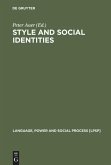Explains the concept of style in speech and examines ways of studying accents and dialects.
Style refers to ways of speaking - how speakers use the resource of language variation to make meaning in social encounters. This book develops a coherent theoretical approach to style in sociolinguistics, illustrated with copious examples. It explains how speakers project different social identities and create different social relationships through their style choices, and how speech-style and social context inter-relate. Style therefore refers to the wide range of strategic actions and performances that speakers engage in, to construct themselves and their social lives. Coupland draws on and integrates a wide variety of contemporary sociolinguistic research as well as his own extensive research in this field. The emphasis is on how social meanings are made locally, in specific relationships, genres, groups and cultures, and on studying language variation as part of the analysis of spoken discourse.
Table of contents:
1. Introduction; 2. Style and meaning in sociolinguistic structure; 3. Style for audiences; 4. Sociolinguistic resources for styling; 5. Styling social identities; 6. High performance and identity stylisation; 7. Coda: style and social reality.
Style refers to ways of speaking - how speakers use the resource of language variation to make meaning in social encounters. This book develops a coherent theoretical approach to style in sociolinguistics, illustrated with copious examples. It explains how speakers project different social identities and create different social relationships through their style choices, and how speech-style and social context inter-relate. Style therefore refers to the wide range of strategic actions and performances that speakers engage in, to construct themselves and their social lives. Coupland draws on and integrates a wide variety of contemporary sociolinguistic research as well as his own extensive research in this field. The emphasis is on how social meanings are made locally, in specific relationships, genres, groups and cultures, and on studying language variation as part of the analysis of spoken discourse.
Table of contents:
1. Introduction; 2. Style and meaning in sociolinguistic structure; 3. Style for audiences; 4. Sociolinguistic resources for styling; 5. Styling social identities; 6. High performance and identity stylisation; 7. Coda: style and social reality.
'This is a bold book that is ultimately trying to overturn a four-decade tradition of mainstream sociolinguistic research, much (though by no means all) of which has been shaped by the variationist paradigm. That said, the tone is admirably level-headed and remarkably undogmatic. It is also suitably reflexive. ... [Coupland] also shows, whilst class-based approaches to language variation were a product of their time - societal functionalism coupled with the economic Fordism of the postwar era - the explanatory power of the Labovian paradigm is well past its use-by date. What we need in its place are theoretical models that can help us to get to grips with the role of language variation and identity in relation to the late-modern, global age in which we now live. Style is a major step in that direction and - without wishing to overstate the point about 'authenticity' - is one of those texts that every serious sociolinguist really does need to read.' Sally Johnson, University of Leeds








